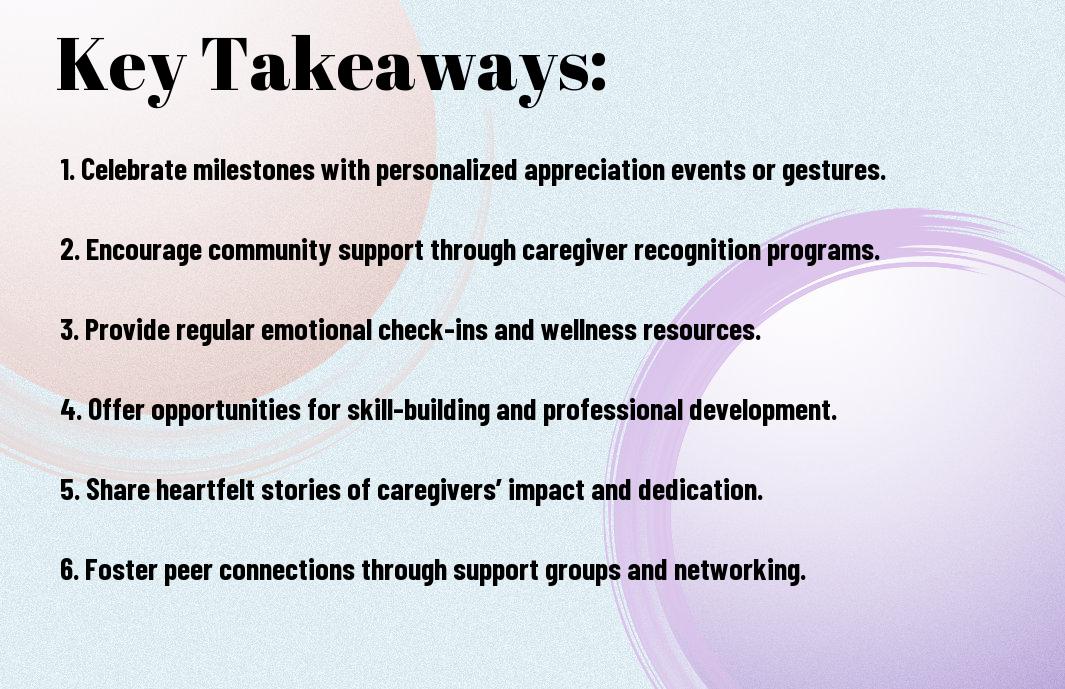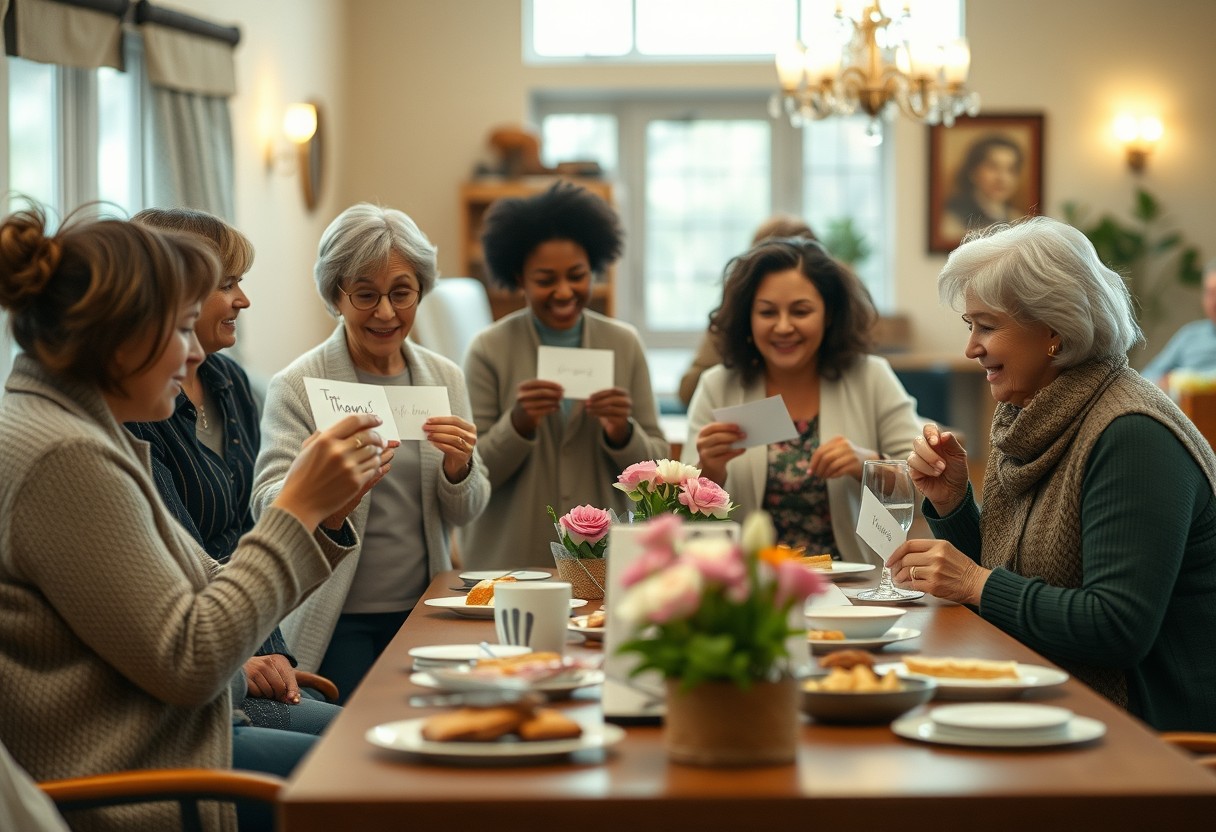There’s a profound yet often overlooked role that caregivers play in society, as they provide vital support to those in need. Recognizing and appreciating their contributions is crucial for not only boosting their morale but also preventing possible burnout. She may feel undervalued, he might struggle to find time for self-care, and they often sacrifice personal needs for the well-being of others. This blog post explores creative methods to show gratitude and support for these dedicated individuals, ensuring they feel valued in their important work.
Key Takeaways:
- Personalized Recognition: Tailoring appreciation methods to individual caregivers can enhance their motivation and reinforce their value within the team.
- Community Involvement: Engaging the broader community to recognize and support caregivers helps to build a strong support network and promotes awareness of their contributions.
- Creative Appreciation Activities: Organizing unique events, such as themed appreciation days or surprise recognition gatherings, can make caregivers feel valued and cherished in a memorable way.


Understanding the Importance of Caregivers
While the invaluable contributions of caregivers often go unnoticed, their role is critical in ensuring the well-being of individuals who require assistance. They provide physical, emotional, and social support, serving not only as caregivers but also as advocates for the needs and rights of those they care for. Recognizing this importance is important for fostering a society that values and supports those who dedicate their lives to caregiving.
The Role of Caregivers in Society
An important pillar of society, caregivers perform a wide range of responsibilities that extend beyond basic assistance. They help maintain the dignity and quality of life for individuals with disabilities, chronic illnesses, or age-related challenges. Their work allows families to manage daily tasks while ensuring loved ones receive the compassionate care needed to thrive.
Challenges Faced by Caregivers
Faced with a plethora of responsibilities, caregivers often experience significant challenges that can impact their well-being. From the lack of financial support to feelings of isolation, they navigate a complex landscape of emotional and physical demands.
Plus, caregivers often encounter emotional stress due to the burdens of their role, leading to burnout and fatigue. Many face financial strain due to reduced work hours or lost wages, making it challenging to provide adequate care while maintaining their own livelihoods. Additionally, limited access to resources and support systems can exacerbate feelings of isolation, creating a cycle of stress that affects both the caregiver and those they care for. Recognizing these challenges is vital for developing interventions that can better support caregivers in their critical roles.
Effective Recognition Strategies
The effectiveness of recognition strategies lies in their ability to genuinely acknowledge the hard work of caregivers. These strategies can create a positive environment that reinforces their commitment and encourages continued support. By employing various methods tailored to individual preferences and contributions, organizations can foster a culture of appreciation that uplifts both caregivers and the communities they serve.
Verbal Appreciation Techniques
Techniques for verbal appreciation can significantly enhance a caregiver’s sense of worth. Managers and peers should practice sincere compliments, offer positive feedback, and express gratitude verbally during meetings or casual interactions. These affirmations, when delivered genuinely, strengthen the caregiver’s morale and validate their dedication to their role.
Written Acknowledgments and Awards
One effective method of recognizing caregivers is through written acknowledgments and awards. These gestures not only memorialize their contributions but also make the appreciation tangible for the recipient.
Acknowledgments can include personalized notes, certificates, or even formal award ceremonies that highlight the caregiver’s achievements. It is crucial to capture specific instances of excellence in these writings to create a meaningful impact. Such recognition can nurture a sense of belonging and motivation, ensuring that caregivers feel valued for their imperative contributions. Additionally, sharing these acknowledgments publicly within the organization can inspire others and foster a culture of recognition that benefits everyone involved.
Creative Ways to Show Appreciation
For caregivers, feeling recognized can significantly enhance their commitment and morale. Simple yet thoughtful gestures, such as personalized notes or public acknowledgments in meetings, can make a world of difference. In addition, engaging in discussions about how to support caregivers and why it matters can lead to more significant changes in policy and culture. Interested readers can learn more about supporting caregivers through this article on How To Support Caregivers And Why It Matters So Much.
Personalized Gifts and Tokens
The act of giving personalized gifts can profoundly impact a caregiver’s emotional well-being. Unique items, such as a custom mug, photo album, or engraved bracelet, can make them feel valued and appreciated. Knowing their efforts are recognized through these personalized tokens not only boosts their morale but also strengthens the bond between them and those they care for.
Celebratory Events and Gatherings
For caregivers, celebratory events can serve as a platform to honor their hard work and dedication. Organizing gatherings, such as appreciation evenings or informal lunches, creates an opportunity for caregivers to connect with each other and share their experiences. These events not only allow them to celebrate their contributions but also foster a sense of community among caregivers.
Gifts and events together create a powerful acknowledgment of caregivers’ sacrifices. By throwing themed appreciation events, organizations can elevate the significance of these gatherings and show how deeply they value caregivers. Events could include fun activities, heartfelt speeches, and meaningful awards that underline the importance of their contributions. Such recognition can motivate caregivers to continue their important work while receiving the emotional boost they need. In these settings, sharing stories can further reinforce their sense of belonging and importance.
Utilizing Technology for Recognition
Many organizations are leveraging technology to ensure that caregivers receive the recognition they deserve. From virtual awards ceremonies to digital shout-outs, technology offers innovative methods for appreciation. Programs that automate recognition, along with platforms that facilitate personal messages, can significantly enhance caregiver morale. For more creative ideas, she can explore 10 Ways to Honor Your Care Team on Caregiver Appreciation ….
Social Media Shout-Outs
Utilizing social media platforms allows organizations to publicly acknowledge and celebrate the hard work of caregivers. By sharing their accomplishments and stories, she can create a culture of appreciation that resonates within the community, fostering a deeper connection among staff and clients alike.
Online Communities and Forums
Any individual looking to recognize caregivers can turn to online communities and forums, which often provide a space for shared experiences and gratitude. By participating in these platforms, they can express appreciation and connect with others who share similar experiences in caregiving.
Recognition in online communities and forums not only improves caregiver morale but also fosters a sense of belonging and support. These platforms can be a source of encouragement, advice, and solidarity for caregivers facing challenges. Moreover, they serve as a venue for the public acknowledgment of hard work, creating a positive environment where caregivers feel valued. Engaging in these communities can help them connect with others who understand their journey, making it a crucial aspect of caregiver appreciation.
Building a Supportive Environment
Keep in mind that creating a supportive environment is vital for caregivers, as it cultivates a sense of belonging and reduces feelings of isolation. By fostering open communication, empathy, and understanding among all team members, organizations can ensure caregivers feel valued and appreciated. Leadership should actively encourage collaboration and provide resources that help strengthen relationships among caregivers, making it easier for them to share experiences and seek help when needed.
Institutional Recognition Programs
On a systemic level, institutional recognition programs play a significant role in affirming the efforts of caregivers. These programs can range from simple appreciation events to more structured awards that highlight outstanding contributions, ultimately boosting morale and fostering dedication. By implementing such initiatives, organizations demonstrate their commitment to acknowledging the hard work and sacrifices caregivers make daily.
Peer Support Groups
On a grassroots level, establishing peer support groups can offer caregivers a valuable space to connect and share their experiences. These groups enable individuals to engage in open discussions, receive emotional support, and exchange practical advice, easing the burden of caregiving. By creating a network of understanding, caregivers can find strength in shared experiences, reinforcing the importance of community.
Peer support groups provide caregivers with a vital *opportunity to connect with those facing similar challenges*. They create a safe space for *expressing frustrations, sharing coping strategies, and celebrating successes*. This communal approach not only helps reduce feelings of *isolation* but also nurtures *resilience and well-being*. As caregivers often face *significant emotional and physical strain*, these groups can become a beacon of hope, encouraging them to prioritize their own health and advocating for balance in their caregiving roles.
Long-term Commitment to Caregiver Appreciation
Not only should organizations recognize the invaluable contributions of caregivers, but they must also foster a culture of appreciation that thrives over the long term. This requires a steadfast commitment to implementing consistent recognition initiatives that evolve with caregivers’ needs. By prioritizing caregiver appreciation, organizations can create an environment that supports well-being and acknowledges the relentless commitment caregivers display in their roles.
Sustainable Recognition Practices
The development of sustainable recognition practices is imperative for maintaining positive morale among caregivers. This includes regular implementation of appreciation events, personalized notes of thanks, and opportunities for professional development. Organizations that prioritize these practices can create an atmosphere where caregivers feel acknowledged and valued, leading to enhanced job satisfaction and reduced turnover.
Continuous Engagement and Feedback
For effective caregiver appreciation, organizations must prioritize continuous engagement and feedback. By regularly soliciting input from caregivers regarding their needs and experiences, they can ensure that recognition efforts are relevant and impactful. This engagement not only helps caregivers feel heard but also informs organizations about areas in which they can improve support systems.
Plus, fostering a culture of continuous engagement and feedback allows organizations to be responsive to caregiver needs, which is crucial for long-term success. Regularly checking in demonstrates a commitment to improvement, ensuring caregivers feel valued and heard. By implementing feedback mechanisms, organizations can identify areas for enhancement in appreciation efforts and create targeted initiatives to address these gaps. This back-and-forth dynamic not only strengthens caregiver satisfaction but also promotes a resilient support system that recognizes and truly values their contributions.
Conclusion
To wrap up, recognizing and appreciating the contributions of caregivers is imperative for their well-being and effectiveness. He, she, and they often face immense challenges, and creative acknowledgment can foster a supportive environment. By implementing innovative initiatives such as personalized thank-you notes, community events, or caregiver appreciation days, organizations and individuals can significantly enhance caregivers’ morale. Ultimately, such efforts not only validate their hard work but also promote a healthier, more sustainable caregiving ecosystem.
FAQ
Q: Why is it important to recognize and appreciate the contributions of caregivers?
A: Recognizing and appreciating caregivers is crucial because it acknowledges the invaluable work they do, often at great personal sacrifice. Caregivers provide necessary support to individuals who may be aging, ill, or disabled, and their efforts significantly enhance the quality of life for those they care for. Appreciation can boost their morale, reduce feelings of isolation, and help prevent burnout. Furthermore, public recognition fosters a culture of respect and understanding towards caregiving roles, which are often undervalued in society.
Q: What are some creative ways to show appreciation to caregivers?
A: There are various creative ways to appreciate caregivers, including personalized thank-you notes, surprise care packages containing self-care items, or organizing a dedicated appreciation event. Additionally, creating a “Wall of Fame” in community centers or social media pages can spotlight individual caregivers and their stories. Offering gift certificates for local restaurants, spa services, or fun activities can also make caregivers feel valued and encourage them to take much-needed breaks.
Q: How can organizations support caregiver recognition initiatives?
A: Organizations can support caregiver recognition initiatives by establishing formal programs that honor caregivers consistently, such as monthly or annual awards. They can also provide training for staff on the importance of caregiver support and appreciation, encouraging a workplace culture that respects these roles. Partnering with local businesses to create special discounts or freebies for caregivers can further demonstrate support. Moreover, organizations can facilitate workshops or support groups aimed at sharing experiences, which reinforce that caregivers are an necessary part of the community.

